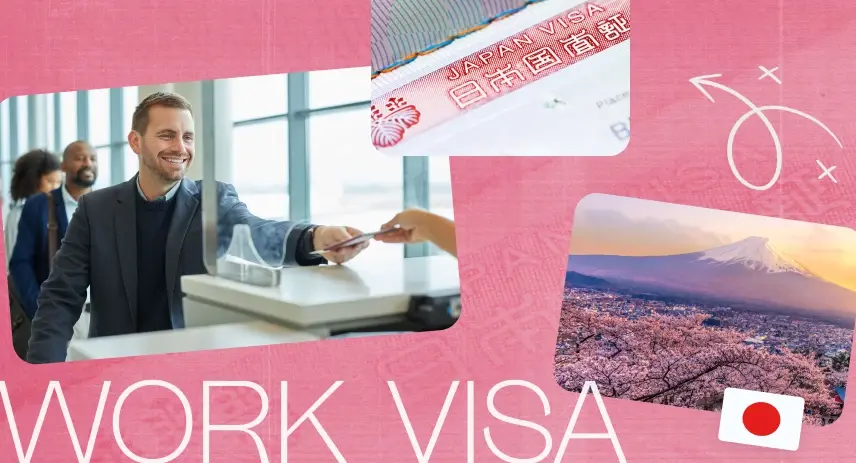What is visa sponsorship?

Visa sponsorship
Visa sponsorship is a process where an individual or organization takes on the legal responsibility of vouching for a foreign national seeking to enter or stay in a host country.
The fine print of visa sponsorship rules and regulations varies by country. In most cases, employers must prove that the candidate is qualified for the role and is essential to business operations. They’re also responsible for providing visa support, which may include securing the appropriate immigrant visas and work permits, covering legal and filing fees, and following local immigration laws.
Types of visa sponsorship
Sponsoring an immigrant takes many forms, depending on a country’s immigration laws and the applicant’s relationship to the sponsor. Here are some of the most common types of visa sponsorships:
Employer sponsorship
Employers often sponsor work visas to hire foreign nationals with specialized skills, like advanced technical knowledge or niche expertise, that aren’t available in the local talent market. Employer work visa sponsorship can also support leadership roles that require international experience or help transfer employees to new offices as part of a global expansion. Common examples include H1-B visas (in the United States), skilled worker visas, intracompany transfer visas, and specialized occupation visas.
No matter the hiring strategy, employers typically need to prove that the applicant is qualified for the role, that their employment is essential to the business, and that they comply with immigration laws to legally reside in the destination country.
Family-based sponsorship
Nonimmigrants, citizens, or permanent residents can sponsor relatives through family reunification visas. Depending on the country, this type of sponsorship may cover spouses, children, parents, and sometimes more distant relatives, allowing families to reunite under specific immigration laws. For many applicants, it’s the first step toward becoming a lawful permanent resident, such as obtaining a green card.
Educational sponsorship
Universities and other academic institutions can also sponsor foreign nationals to study in the host country. International student visa applicants often need to meet specific academic requirements, like maintaining a minimum GPA or completing their studies within a set timeframe.
Investor or business sponsorship
Immigrants who contribute significant capital to a company in the host country may qualify for a business or investor visa. Many applicants work with immigration services providers to manage the visa application process. Typically, applicants must show the source of their investment funds, how they plan to manage the investment, and how their contribution will create jobs or stimulate economic growth.
Benefits and challenges of visa sponsorship
Hiring foreign nationals is a valuable strategy for many employers building international teams, but it also comes with legal and logistical demands. Here are some key benefits and challenges to keep in mind when planning to sponsor a potential international hire:
Benefits of visa sponsorship
Think of visa sponsorship as your passport to a stronger, uniquely skilled, globally connected workforce.
- Expand global reach: Hiring foreign nationals gives companies access to a broader talent pool and specialized skills that may not be available locally.
- Support workforce mobility: Visa sponsorship enables the transfer of high performers or specialists across offices, supporting growth in new markets.
- Promote cultural diversity: A globally diverse team brings fresh perspectives that can improve innovation, problem-solving, and collaboration.
Challenges of visa sponsorship
Visa sponsorship opens doors to new opportunities, but it also requires navigating rules, risks, and red tape.
- Complex immigration laws: Regulations vary widely by country and visa type. For example, U.S. Department of Labor and USCIS (U.S. Citizenship and Immigration Services) requirements differ significantly from regulations in other countries, making compliance a constant challenge.
- Extensive paperwork process: Preparing and filing applications, affidavits of support, and other required documentation takes time and attention to detail, especially for employers unfamiliar with the process.
- Fees and legal risks: Sponsorship often involves high legal and filing costs, and mistakes can result in fines and visa denials.
How to sponsor a visa: The process for employers
While the specifics vary across countries, sponsoring a visa for a foreign employee generally follows a similar process based on immigration laws and employer obligations. Here’s an overview:
- Identify the need for sponsorship: Review staffing gaps to determine where international talent can add value, such as filling local skill shortages or bringing specialized expertise.
- Choose the right visa type: Select a visa category that matches the job role, employment duration, and the candidate’s qualifications
- Check employee eligibility: Confirm that the prospective hire or transfer meets all requirements, including education, skills, language proficiency, and proof of financial means to support themselves during their stay.
- Submit the visa petition: Complete and submit all required immigration forms and supporting documents to the appropriate immigration authority.
- Pay fees: Cover any applicable visa petition or processing fees.
- Provide a job offer: Extend a formal employment offer that outlines the job title, responsibilities, compensation, and terms in compliance with local labor and immigration laws.
- Support the employee’s visa application: Guide the candidate through the next steps, like applying at a consulate or embassy, attending the interview, and securing final approval.
- Assist employees with relocation: Help with logistics like travel, housing, and onboarding to ease the employee’s transition to the new location.
- Maintain ongoing compliance: Keep accurate records and meet reporting requirements to remain compliant with immigration laws throughout the employee’s time with the company.
Avoid risks and complexities with Oyster
Found the perfect international hire who needs visa sponsorship? Or maybe a digital nomad who’s ready to relocate and join your team on the ground? Oyster makes the transition seamless. From managing paperwork to ensuring compliance with local regulations, Oyster simplifies visa sponsorship with end-to-end mobility support for growing global teams.
Request a demo to learn how Oyster supports talent mobility for global teams.
.avif)
Visa sponsorship FAQs
What’s the difference between visa sponsorship and a visa application?
Visa sponsorship means an individual or organization agrees to support a foreign national's eligibility to enter or stay in a host country. A visa application is the formal request that the foreign national submits to immigration immigration authorities, such as for a work visa, an investor visa, or a digital nomad visa, which may or may not require a sponsor’s backing.
Can visa sponsorship be rescinded?
Yes. A sponsor can withdraw support before the visa is approved, though the process and consequences vary depending on the visa type and local immigration laws.
How long does the visa sponsorship process take?
Processing times for visa sponsorship depend on the visa type and the country's immigration policies. For example, sponsoring an H-1B visa in the U.S. can take several months.
What happens if a sponsorship is terminated?
In some cases, sponsorship can be cancelled after visa approval, such as if an employer ends the employment relationship or violates the sponsorship terms. The visa holder may then need to find a different sponsor or adjust their visa status to legally remain in the host country.
What are the main responsibilities of the sponsor?
Sponsors must provide adequate financial support (like a livable wage), ensure that the visa holder follows local laws, and verify employment eligibility. Employers must also track visa expiration dates and report job changes to immigration authorities.
Disclaimer: The information provided above offers a general overview of visa sponsorship, but immigration laws vary by country and can change. This content is for informational purposes and not legal advice. Consult with immigration professionals for accurate and up-to-date guidance specific to your situation. Adherence to host country immigration laws is crucial, and noncompliance may lead to legal consequences.
About Oyster
Oyster is a global employment platform designed to enable visionary HR leaders to find, hire, pay, manage, develop, and take care of a thriving distributed workforce. Oyster lets growing companies give valued international team members the experience they deserve, without the usual headaches and expense.
Oyster enables hiring anywhere in the world—with reliable, compliant payroll, and great local benefits and perks.

Related Resources


.webp)

.webp)



_Leader_Leader%201%20(2)%20(3).svg)
_Leader_UnitedKingdom_Leader%201%20(1).svg)
_Leader_Europe_Leader%201%20(1).svg)
_Leader_Mid-Market_Leader%201%20(1).svg)
_Leader_Small-Business_Europe_Leader%202%20(2).svg)
_Leader_Small-Business_Leader%201%20(1).svg)
_FastestImplementation_Small-Business_GoLiveTime%201%20(1)%20(1).svg)